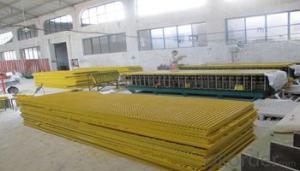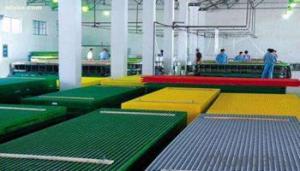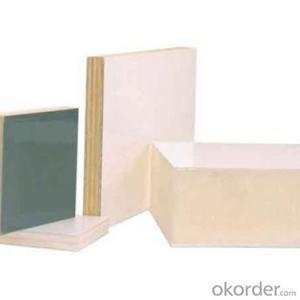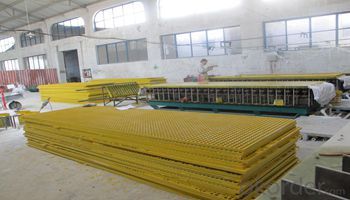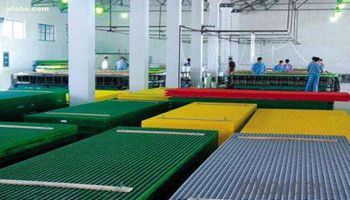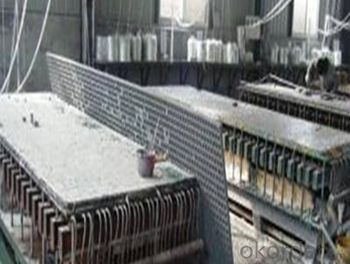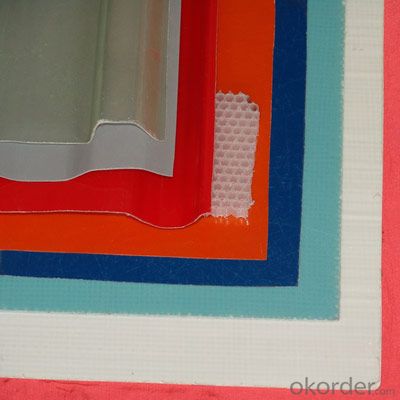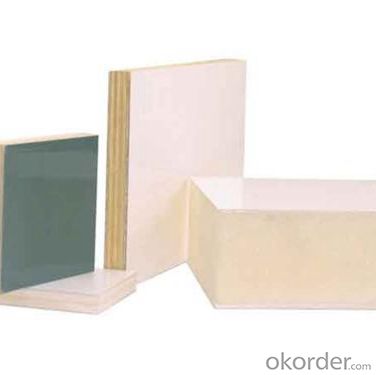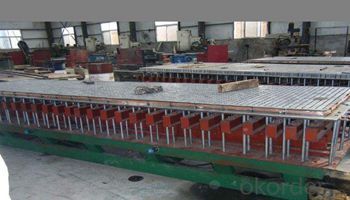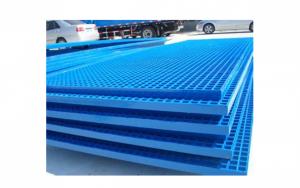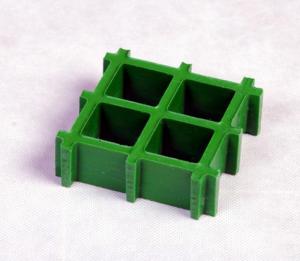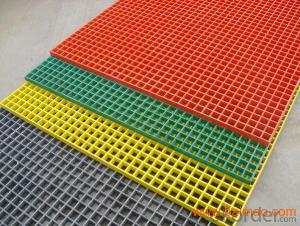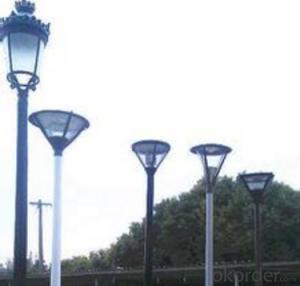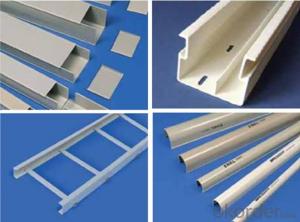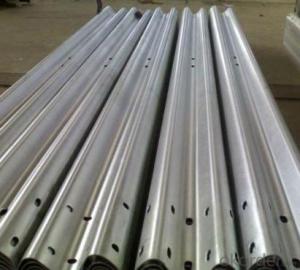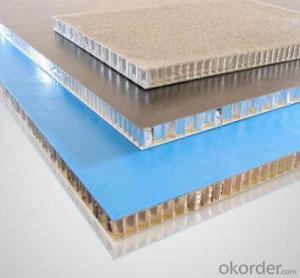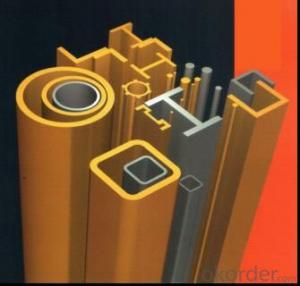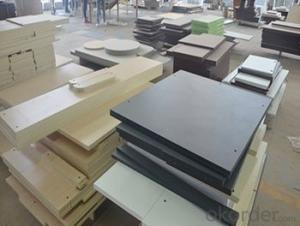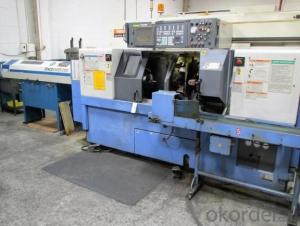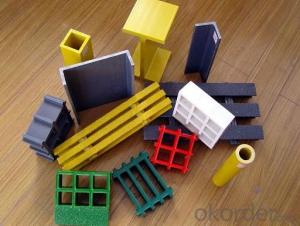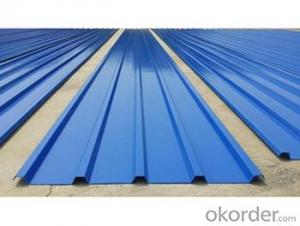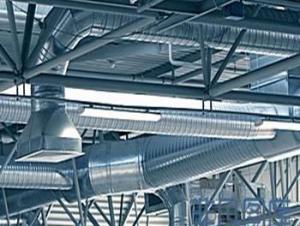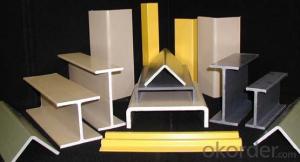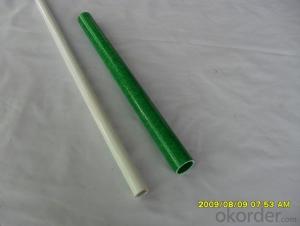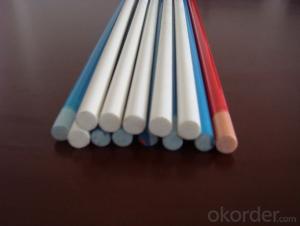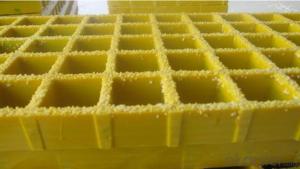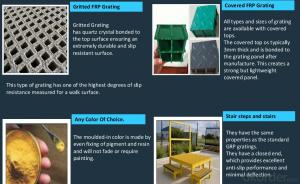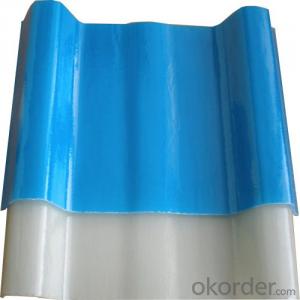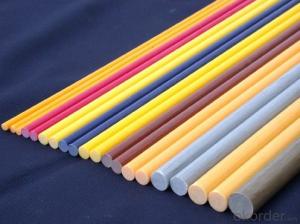FRP Pultrusion Profiles - Pultruded Grating with Easy Maintenance and High Quality
- Loading Port:
- Tianjin
- Payment Terms:
- TT OR LC
- Min Order Qty:
- 4000 m.t.
- Supply Capability:
- 50000 m.t./month
OKorder Service Pledge
OKorder Financial Service
You Might Also Like
Specification
PRODUCT DESCRIPTION
Pultruded grating is made by a particular assembly process, which using “I” shape as its main load-bearing and special rod to go through the bearing bar. Pultruded grating include the standard grating and the custom grating, the custom grating can be designed to meet customer’s requirement or special using condition by changing the shape, size and space of the bearing bars, the surface can be covered with lozenge panel, grit panel, or added the anti-slippery sand directly.
FRP pultruded grating has the most characteristics of molded grating, but it has its distinct advantages, it has very high fiberglass content in the loading direction, so it has very high load capability, it has more superiority when used at wide span, so that the basic support will be decreased and the project cost will be reduced accordingly.
SPECIFICATION
The standard space between two crossbars is 6 inch or 12 inch.
Thickness (mm) | Bar width (mm) | Open space (mm) | Open rate (%) | Approx weight (kg/m |
25.4 | 15.2 | 22.8 | 60 | 13.2 |
25.4 | 15.2 | 15.2 | 50 | 15.9 |
25.4 | 15.2 | 10.1 | 40 | 18.5 |
25.4 | 40 | 10.8 | 21 | 14.5 |
38.1 | 15.2 | 22.8 | 60 | 15.8 |
38.1 | 15.2 | 15.2 | 50 | 19.1 |
38.1 | 15.2 | 10.1 | 40 | 22.4 |
50.8 | 25.4 | 25.4 | 50 | 16.6 |
50.8 | 25.4 | 12.7 | 33 | 21.1 |
CHOICE FOR PULTRUDED GRATING
Resin: GP resin, ISO resin, VE resin, Phenol resin
Color choice: Yellow, gray, green, custom color
Surface choice: Groove surface, grit surface, lozenge cover surface
FEATURES
a. Anti-corrosion and anti-rust
b. Light weight and high strength
c. Anti-flammable
d. Anti- fatigue
e. Safe and anti-slippery
f. Anti-ageing
g. Easy of maintenance
h. Excellent electromagnetism property
i. Good economic benefit
FIELDS SERVED
Sewage treatment,
water supply and drainage,
chemical industry,
oil industry,
power engineering,
pulp and paper,
construction engineering,
spinning, marine engineering.
APPLICATION
Operation terrace,
stair walkway,
ground floor,
trench cover,
sidewalk,
foot bridge,
equipment safety fence,
scaffold.
COMPANT DESCRIPTION
CNBM,China National Building Materials Group is a state-owned enterprise in charge of administrative affairs in china building materials industry. Established in 1984, CNBM is a large group corporation of building materials with total assets of 25 billion RMB and a total staff of 30,000.CNBM now owns 200 subordinating firms of solely owned and joint-venture companies.
CNBM International Corporation is one subsidiary of CNBM, we focus on offering good-quality products,professional service and complete solution to our customers. Strong delivery capacity, advanced technology& management, strong financing capability and excellent after-sale service are our advantages in sharing international market.
FAQ
Q1.What's your sample policy?
A:We can supply the sample if we have ready parts in stock, but the customers have to pay the courier cost.
Q2.Can you produce according to the samples?
A: Yes, we can produce or modify the products according to your request.
Q3.How do you deliver the goods to my country?
A:We can provide international express, such as DHL, EMS, UPS, FedEx, etc. We select air freight and sea freight upon your requests. Quotations if without mentioning the shipping costs are shipping fee excluded.
Q4.How much does it cost to ship to my country?
A:When you goanna to place an order, please contact us, because different country has different freight.
Q5.How to get the catalogue?
A:please contact us and tell us what you are looking for.
We will try our best to meet customers' demands. Welcome you come here to visit us. We sincerely welcome partners around the world to establish business cooperation with us on the basis of mutual trust, benefit and development.
PICTURES
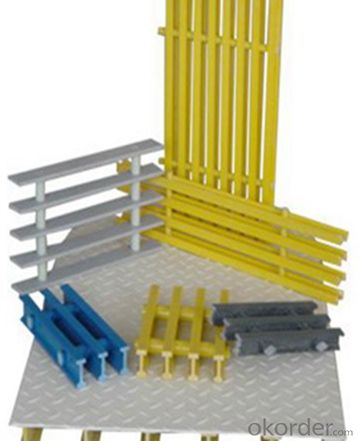
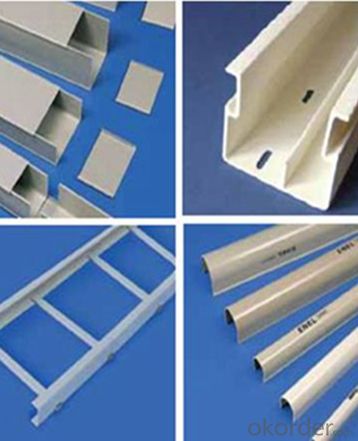
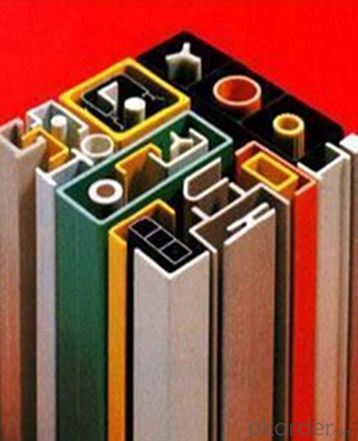
- Q: How do FRP pultrusion profiles perform in high-vibration applications?
- FRP pultrusion profiles perform exceptionally well in high-vibration applications. Due to their inherent structural properties, including high strength-to-weight ratio and excellent fatigue resistance, they can effectively withstand and dampen vibrations without compromising their integrity or performance. Additionally, their non-corrosive nature makes them ideal for long-term use in high-vibration environments, providing enhanced durability and reliability.
- Q: Are FRP pultrusion profiles resistant to impact from heavy machinery?
- FRP pultrusion profiles are generally known for their high strength-to-weight ratio and excellent mechanical properties, which make them resistant to various external impacts. However, the specific resistance to impact from heavy machinery depends on several factors. Firstly, the design and composition of the FRP pultrusion profiles play a vital role in determining their impact resistance. Different manufacturers may use various reinforcement materials, such as fiberglass, carbon fiber, or other composites, which can significantly affect the profiles' ability to withstand heavy machinery impacts. Additionally, the thickness and overall dimensions of the FRP profiles contribute to their impact resistance. Thicker profiles tend to provide higher resistance to impact loads compared to thinner ones. Moreover, profiles with reinforced sections or additional layers for structural integrity can further enhance their impact resistance. It is also essential to consider the specific application and the magnitude of impact expected from heavy machinery. While FRP pultrusion profiles can generally withstand moderate to high impacts, extreme forces or heavy machinery with substantial weight may still cause damage. In such cases, additional protective measures like using impact-resistant coatings or reinforcing the profiles with metal inserts may be necessary. Overall, FRP pultrusion profiles exhibit good resistance to impact from heavy machinery due to their inherent strength and durability. However, it is always recommended to consult with the manufacturer or a structural engineer to ensure the profiles meet the specific requirements of the application and machinery involved.
- Q: Can FRP pultrusion profiles be used in agricultural structures?
- Yes, FRP pultrusion profiles can be used in agricultural structures. FRP (Fiber Reinforced Polymer) pultrusion profiles offer several advantages that make them suitable for agricultural applications. Firstly, FRP profiles are corrosion-resistant, which is crucial in the agricultural industry where structures are exposed to harsh environments and chemicals, such as fertilizers and pesticides. Unlike traditional materials like steel or wood, FRP does not rust or decay, ensuring long-lasting performance in agricultural structures. Secondly, FRP profiles are lightweight yet durable, making them easy to handle and install in agricultural applications. They have high strength-to-weight ratios, allowing for efficient construction and reducing the need for heavy machinery during installation. Additionally, FRP profiles offer excellent mechanical properties such as high stiffness and impact resistance, which are beneficial for agricultural structures that may face heavy loads, vibrations, or impact from machinery. Furthermore, FRP pultrusion profiles can be designed to be UV resistant, preventing degradation from prolonged exposure to sunlight. This makes them suitable for outdoor agricultural structures that are constantly exposed to the elements. Lastly, FRP profiles are non-conductive, which is advantageous in agricultural environments where electrical safety is critical. This property eliminates the risk of electrical hazards associated with conductive materials like steel. Overall, FRP pultrusion profiles provide a reliable and efficient solution for various agricultural structures, such as greenhouse frames, livestock enclosures, irrigation systems, and storage facilities. Their corrosion resistance, lightweight nature, high strength, UV resistance, and non-conductivity make them a suitable choice for agricultural applications.
- Q: Can FRP pultrusion profiles be used in electrical or telecommunications applications?
- FRP pultrusion profiles have a wide range of applications in the electrical and telecommunications industries. These profiles are highly regarded for their exceptional electrical insulating properties, impressive strength-to-weight ratio, and resistance to corrosion. As a result, they are well-suited for various electrical and telecommunications purposes. When it comes to electrical applications, FRP pultrusion profiles can function as electrical insulators, cable trays, busbar supports, and electrical enclosures. They serve to insulate and safeguard against electrical shocks, making them a popular choice for replacing traditional materials like metal or wood. Moreover, their non-conductive properties, along with their lightweight and easy installation, make them highly suitable for electrical applications. In the realm of telecommunications, FRP pultrusion profiles are utilized for cable management systems, antenna supports, and equipment enclosures. Similar to their electrical applications, the non-conductive nature of these profiles ensures the safety and reliability of the telecommunications infrastructure. Additionally, these profiles can be tailored to meet specific design requirements, such as incorporating cable routing channels or equipment mounting brackets. Furthermore, FRP pultrusion profiles exhibit exceptional resistance to harsh environmental conditions, such as moisture, UV radiation, and chemicals. This makes them an excellent choice for outdoor electrical or telecommunications installations, where exposure to these elements is commonplace. All in all, FRP pultrusion profiles have proven themselves to be a dependable and cost-effective option for electrical and telecommunications applications. They provide insulation, strength, durability, and resistance to environmental factors, making them highly sought-after in these industries.
- Q: What is the impact resistance of FRP pultrusion profiles?
- The impact resistance of FRP pultrusion profiles is generally high due to the inherent strength and durability of the fiberglass reinforcement. The specific impact resistance may vary depending on factors such as the resin type, fiber orientation, and manufacturing process. However, FRP pultrusion profiles are known to exhibit excellent resistance to impacts and can withstand heavy loads and external forces without experiencing significant damage or deformation.
- Q: Are FRP pultrusion profiles resistant to electrical surges or lightning strikes?
- FRP pultrusion profiles have inherent electrical insulation properties due to their composition of fiberglass reinforcement and resin matrix. This insulation makes them resistant to electrical surges and lightning strikes to some extent. However, it is important to note that no material can provide absolute protection against extremely high voltage electrical surges or direct lightning strikes. In such cases, additional measures like grounding and lightning protection systems are necessary to ensure the safety of structures or equipment. Therefore, while FRP pultrusion profiles offer some level of resistance to electrical surges and lightning strikes, it is advisable to consult with experts and adhere to relevant safety standards when designing and installing electrical systems in areas prone to such events.
- Q: Can FRP pultrusion profiles be used in the transportation and logistics industry?
- Yes, FRP pultrusion profiles can be used in the transportation and logistics industry. These profiles offer a lightweight and high-strength alternative to traditional materials like steel or aluminum. They are resistant to corrosion, have excellent dimensional stability, and can be customized to meet specific design requirements. FRP pultrusion profiles are commonly used in applications such as truck bodies, trailers, shipping containers, and infrastructure for transportation and logistics purposes.
- Q: Can FRP pultrusion profiles be used in the construction of railway platforms?
- Indeed, railway platforms can be constructed using FRP (Fiber Reinforced Polymer) pultrusion profiles. These profiles possess numerous advantages that render them suitable for this particular application. To begin with, FRP pultrusion profiles exhibit a combination of lightweight and high durability. Consequently, they are well-suited for railway platforms as they can withstand heavy loads and frequent foot traffic without experiencing significant deformation or degradation over time. Moreover, FRP pultruded profiles boast exceptional corrosion resistance. This feature is particularly crucial for railway platforms, which frequently encounter harsh environmental conditions such as rain, snow, and salt. Unlike traditional materials like steel or wood, FRP does not undergo rust or rot, ensuring a longer lifespan for the platform. Additionally, FRP pultrusion profiles offer versatility in design. They can be customized to meet specific dimensional and structural requirements, facilitating the creation of platforms in various shapes and sizes. This adaptability proves beneficial for railway platforms, which often need to be tailored to fit the available space and accommodate specific railway configurations. Furthermore, FRP pultrusion profiles possess excellent electrical insulation properties. This attribute is vital for railway platforms, as they necessitate electrical isolation from the tracks to prevent electrical shocks and guarantee passenger safety. Lastly, FRP pultrusion profiles are convenient to install and require minimal maintenance. They can be prefabricated off-site and rapidly assembled on-site, thereby reducing construction time and costs. Furthermore, FRP does not demand regular painting or sealing, resulting in time and cost savings in terms of maintenance. In conclusion, due to their lightweight nature, durability, corrosion resistance, design flexibility, electrical insulation properties, and ease of installation and maintenance, FRP pultrusion profiles serve as a viable option for constructing railway platforms.
- Q: Can FRP pultrusion profiles be used in chemical storage tanks?
- Yes, FRP (Fiber Reinforced Polymer) pultrusion profiles can be used in chemical storage tanks. FRP pultrusion profiles are known for their excellent corrosion resistance, making them suitable for storing a wide range of chemicals. They are also lightweight, strong, and have a high strength-to-weight ratio, which makes them an ideal choice for constructing durable and long-lasting chemical storage tanks. Additionally, FRP pultrusion profiles can be customized to meet specific design requirements, allowing for flexibility in tank design and construction. Overall, FRP pultrusion profiles are a reliable and cost-effective option for chemical storage tanks due to their corrosion resistance, strength, and customization capabilities.
- Q: Are FRP pultrusion profiles resistant to chemicals used in pharmaceutical manufacturing?
- Yes, FRP (Fiber Reinforced Plastic) pultrusion profiles are highly resistant to chemicals used in pharmaceutical manufacturing. FRP profiles are made by impregnating fibers with a resin matrix, typically polyester or vinyl ester, which provides excellent chemical resistance. These profiles are designed to withstand exposure to a wide range of chemicals including acids, alkalis, solvents, and various cleaning agents commonly used in pharmaceutical manufacturing processes. The combination of the fiber reinforcement and the chemical-resistant resin matrix makes FRP pultrusion profiles an ideal choice for applications where exposure to aggressive chemicals is a concern. Unlike traditional materials like steel or wood, FRP profiles do not corrode or react chemically with the substances they come into contact with. Furthermore, FRP pultrusion profiles offer several other advantages for pharmaceutical manufacturing applications. They have exceptional strength-to-weight ratio, are non-conductive, and have high mechanical resistance. Additionally, FRP is a non-porous material, preventing the absorption or release of chemicals, which is crucial for maintaining strict hygiene and avoiding contamination in pharmaceutical processes. Overall, FRP pultrusion profiles are a reliable and durable choice for pharmaceutical manufacturing environments, providing excellent resistance to the chemicals commonly used in these processes.
Send your message to us
FRP Pultrusion Profiles - Pultruded Grating with Easy Maintenance and High Quality
- Loading Port:
- Tianjin
- Payment Terms:
- TT OR LC
- Min Order Qty:
- 4000 m.t.
- Supply Capability:
- 50000 m.t./month
OKorder Service Pledge
OKorder Financial Service
Similar products
Hot products
Hot Searches
Related keywords
